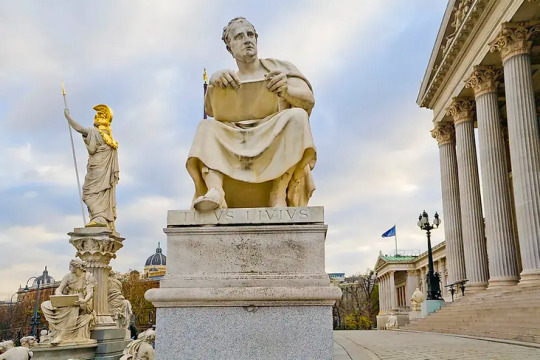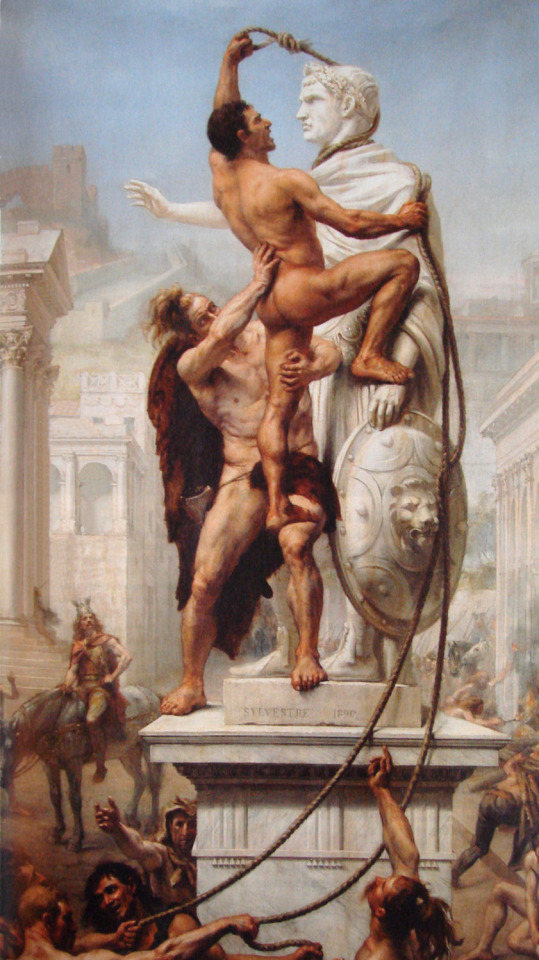#titus livius
Text
imagine this: you're the baddest bitch in the Roman Republic. you have spent the past few decades fighting, fucking and planning to take control of the known world. you've killed millions of people. you became the fucking pontifex maximus and used some guy's idea to reinvent the calendar. you were the first roman to have a terrible vacation experience in the UK. you won a civil war. your best friend likes to commission naked statues of you and stand in front of them calling you a king at parties.
it's the 15th March 44 b.c.e and life is good. the people love you and you just became a dictator for life. you leave your mansion, ignoring your wife's pleas for you to stay (venus above that woman is in love with you) and shake off the soothsayer who keeps following you around and talking about your doom (spurinna is obsessed with you). you swagger into work, sit down, and are immediately stabbed by a bunch of your coworkers. you stagger around for a bit feeling sorry for yourself, before collapsing down dead at the statue of the guy that you had that civil war against. what a way to go.
#can you imagine?#all that work just to be stabbed by a bunch of wannabe revolutionaries#wearing togas#only for the guy after you to just use all of that power you created anyways?#kind of embarrassing ngl#ides of march#julius caesar#caesar#et tu brutus?#ancient rome#gaius julius caesar#gaius cassius longinus#marcus junius brutus#marcus antonius#spurinna#calpurnia#plutarch#life of caesar#classics#titus livius#tacitus#pompey the great
675 notes
·
View notes
Text

The Continence of Scipio by Pompeo Batoni
#scipio#art#pompeo batoni#publius cornelius scipio#scipio africanus#allucius#clemency#continence#ancient rome#roman#romans#roman republic#second punic war#punic wars#spain#hispania#iberia#iberian peninsula#cartagena#carthage#carthaginian#antiquity#rome#europe#european#history#livy#celtiberian#prince#titus livius
37 notes
·
View notes
Text
"Yet, however this shall be, it will be a satisfaction to have done myself as much as lies in me to commemorate the deeds of the foremost people of the world; and if in so vast a company of writers my own reputation should be obscure, my consolation would be the fame and greatness of those whose renown will throw mine into the shade."
Tell me this is not one of the most beautiful things. I admire him doing something that took a lot of effort, not for fame at all but for himself. Even if it was going to fail, he still went for it.
And the most beautiful part? "my consolation would be the fame and greatness of those whose renown will throw mine into the shade". I so simply admire his mindset. Him not hating those who might outshine him, but instead making peace with that, maybe even wishing them the best. I cannot even begin to talk about how this mindset is the best one to have. He had good intentions from the start, he was humble to some degree, but he did not think of himself as superiour or the best. There was no proudness, just his hard work, which even after two millenia paid off
#livy#titus livius#ab urbe condita#mindset#kindness#renow#reading#dark academia#latin#the roman empire#readers of tumblr
2 notes
·
View notes
Text

I am a Roman,' he said to the king; 'my name is Gaius Mucius. I came here to kill you - my enemy. I have as much courage to die as to kill. It is our Roman way to do and to suffer bravely. Nor am I alone in my resolve against your life; behind me is a long line of men eager for the same honor. Brace yourself, if you will, for the struggle - a struggle for your life from hour to hour, with an armed enemy always at your door. That is the war we declare against you: you need fear no action in the battlefield, army against army; it will be fought against you alone, by one of us at a time.'
Porsena in rage and alarm ordered the prisoner to be burnt alive unless he at once divulged the plot thus obscurely hinted at, whereupon Mucius, crying: 'See how cheap men hold their bodies when they care only for honor!' thrust his right hand into the fire which had been kindled for a sacrifice, and let it burn there as if he were unconscious of the pain. Porsena was so astonished by the young man's almost superhuman endurance that he leapt to his feet and ordered his guards to drag him from the altar. 'Go free,' he said; 'you have dared to be a worse enemy to yourself than to me. I should bless your courage, if it lay with my country to dispose of it. But, as that cannot be, I, as an honorable enemy, grant you pardon, life, and liberty.'
'Since you respect courage,' Mucius replied, as if he were thanking him for his generosity, 'I will tell you in gratitude what you could not force from me by threats. There are three hundred of us in Rome, all young like myself, and all of noble blood, who have sworn an attempt upon your life in this fashion. It was I who drew the first lot; the rest will follow, each in his turn and time, until fortune favor us and we have got you.'
The release of Mucius (who was afterwards known as Scaevola, or the Left-Handed Man, from the loss of his right hand) was quickly followed by the arrival in Rome of envoys from Porsena. The first attempt upon his life, foiled only by a lucky mistake, and the prospect of having to face the same thing again from every one of the remaining conspirators, had so shaken the king that he was coming forward with proposals for peace.
Titus Livius
#gaius mucius scaevola#quote#titus livius#book#the history of the decline and fall of the roman empire#edward gibbon#mos maiorum#astutia#roman republic#rome#roman#spqr
2 notes
·
View notes
Text
‘I too am happy to have reached the end of the Punic War. I somehow feel I have personally taken part in its hardships and dangers! I realize that it is most inappropriate for one who has made the rash promise to cover all Roman history to flag in specific sections of such a great work; and yet it does occur to me that the sixty-three years between the beginning of the First Punic War and the end of the Second have taken up as many rolls as did the four hundred and eighty-eight years between the foundation of the city and the consulship of Appius Claudius, the man who began the first war with Carthage.
I feel like someone who wades out into the sea after being initially attracted to the water by the shallows next to the shore; and I foresee any advance only taking me into even more enormous, indeed bottomless, depths, and that this undertaking of mine, which seemed to be diminishing as I was completing the earliest sections, is now almost increasing in size.’
Livy, from Ab Urbe Condita 31.1
5 notes
·
View notes
Text
Without planning to, I have recommenced reading Roman history at the outbreak of the conflict between Philip of Macedon and Rome in 200 BCE - it’s just the book of Livy’s Ab Urbe Condita I was up to when I stopped - and I can’t tell you how jarring it is to go from studying the Arkhidamian War, where Athens basically owned the sea, to this:
‘Pirate ships from Chalcis, formerly a menace to the Athenians, not just on the open sea but also in all their coastal farmland, no longer even dared to ply the sea beyond the Strait of Euripides, much less round Cape Souinon…’
And aside from the specifically Greek context, the idea of Athens so changed, there’s another feeling to it all - like Hellas used to be the whole world, now it’s just a tiny piece of it. It’s really getting me in my feels.
I get that in large part it’s a perspective thing - Thucydides was invested in Hellas, it was personal, small scale - while Livy is an outsider looking in, from a much larger Empire who had just conquered Carthage - But it’s still startling, y’know? An adjustment to make.
2 notes
·
View notes
Text
Imagine being named TITUS LIVIUS or whatever and then bitches two thousand years and change from your lifetime are walking around calling u livy like ur some diminutive prissy purse dog who belongs to a woman named Jennahveve who drinks bleach laced with rose quartz on a daily basis
2 notes
·
View notes
Photo



Titus Livius statue at the Austrian Parliament Building in Vienna, Austria + Home Alone by Chris Columbus & John Hughes (1990)
I am not unaware that the heedlessness underlying the widespread modern refusal to believe that gods issue portents also causes prodigies no longer to be announced in public or included in the historical record. Nevertheless, as I write about bygone affairs, my mind in some way takes on an antique cast, and a certain spirit of religious respect prevents me from regarding as unworthy of recording in my history matters that the deeply sagacious men of old deemed meritorious of public attention. (43.13)
—Livy, Rome's Mediterranean Empire
Livy’s history of Rome is known in Latin as Ab Urbe Condita (‘From the Foundation of the City’) and originally consisted of 142 ‘books’ (the longest is about sixty-five pages in English). He begins with Aeneas’ flight to Italy after the Trojan War. Book 120 ends in 43 bce with the death of Cicero, which may originally have been intended as the conclusion. Livy eventually went at least as far as 9 bce; the death of Augustus’ stepson Drusus in that year was included in Book 142. Of the original work, Books 1-10 and 21-45 survive. The rest were lost before the manuscripts of late antiquity and the Middle Ages were published in modern book form during the Renaissance. Almost the entirety of Ab Urbe Condita, however, is preserved in summaries. Within a century of Livy’s death, there was at least one abbreviated version in circulation. Currently, two sets of summaries are known: one, referred to as the Periochae and varying in length from a few pages to a few sentences per book, covers all but Books 136 and 137; the second, the ‘Oxyrhynchus’ epitomes, is incomplete and fragmentary.
—Jane D. Chaplin, Intro to Rome's Mediterranean Empire by Livy
#Livy#Titus Livius#Roman history#Drusus#Nero Claudius Drusus#Home Alone#Macaulay Culkin#John Hughes#Chris Columbus
0 notes
Photo

Baimės priežastis – nežinomybė.
- Titus Livius -
0 notes
Text
group projects are literally the worst thing to happen idc that learning how to work with other ppl is important if in my adulthood i have to make stupid powerpoints and beg the other ppl in my group to do anything not half-assed im killing myself
#almost started a fight today w my friend by saying well maybe if u didn’t use chatgpt for everything we wouldn’t be here but i stopped#myself bc that wouldn’t have gotten us anywhere#this project is for LATIN . btw. im suffering bc of titus livius and tacitus rn
1 note
·
View note
Text
when the virtue machine fucking broke............
#titus livius hashtag sallustcore moments virtue machine broke understandable have a nice battle of the allia#when you're a roman envoy and you commit the Big Moral Crime of not being neutral and fighting alongside the etruscans#and livy describes it in extra super virtuous language even as it is extremely in no way virtuous......#'tantum eminebat peregrina virtus' like 'so much did the foreign (as in they are romans among etruscans) virtue shine forth'#but also ouhfoghuouhgohgf what if hashtag roman virtue Was No Longer Roman even at the moment that it was its most#blatantly roman and blatantly virtuous#this is so sexy sallust recite the bellum catilinae#hashtag ben jonson secretly translating lucan to describe the battle of pistoria They Knew Not What A Crime Their Valour Was#virtue machine BROKE#livy#beeps
8 notes
·
View notes
Text
When I was in ninth grade I wanted to challenge what I saw as a very stupid dress code policy (not being allowed to wear spikes regardless of the size or sharpness of the spikes). My dad said to me, “What is your objective?”
He said it over and over. I contemplated that. I wanted to change an unfair dress code. What did I stand to gain? What did I stand to lose? If what I really wanted was to change the dress code, what would be my most effective potential approach? (He also gave me Discourses on the Fall of Rome by Titus Livius, Machiavelli’s magnum opus. Of course he’d already given me The Prince, Five Rings, and The Art of War.)
I ultimately printed out that phrase, coated it in Mod Podge, and clipped it to my bathroom mirror so I would look at it and think about it every day.
What is your objective?
Forget about how you feel. Ask yourself, what do you want to see happen? And then ask, how can you make it happen? Who needs to agree with you? Who has the power to implement this change? What are the points where you have leverage over them? If you use that leverage now, will you impair your ability to use it in the future? Getting what you want is about effectiveness. It is not about being an alpha or a sigma or whatever other bullshit the men’s right whiners are on about now. You won’t find any MRA talking points in Musashi, because they are not relevant.
I had no clear leverage on the dress code issue. My parents were not on the PTA; neither were any of my friend’s parents who liked me. The teachers did not care about this. Ultimately I just wore what I wanted, my patent leather collar from Hot Topic with large but flattened spikes, and I had guessed correctly—the teachers also did not care enough to discipline me.
I often see people on tumblr, mostly the very young, flail around in discourse. They don’t have an objective. They don’t know what they want to achieve, and they have never thought about strategizing and interpersonal effectiveness. No one can get everything they want by being an asshole. You must be able to work with other people, and that includes smiling when you hate them.
Read Machiavelli. Start with The Prince, but then move on to Discourses. Read Musashi’s Five Rings. Read The Art of War. They’re classics for a reason. They can’t cover all situations, but they can do more for how you think about strategizing than anything you’re getting in middle school and high school curricula.
Don’t vote third party unless you can tell me not only what your objective is but also why this action stands a meaningful chance of accomplishing it. Otherwise, back up and approach your strategy from a new angle. I don’t care how angry you are with Biden right now. He knows about it, and he is both trying to do something and not doing enough. I care about what will happen to millions of people if we have another Trump presidency. Look up Ross Perot, and learn from our past. Find your objective. If it is to stop the genocide in Palestine now, call your elected representatives now. They don’t care about emails; they care about phone calls, because they live in the past. I know this because I shadowed a lobbyist, because knowing how power works is critical to using it.
How do you think I have gotten two clinics to start including gender care in their planning?
Start small. Chip away. Keep working. Find your leverage; figure out how and when to effectively use it. Choose your battles, so that you can concentrate on the battle at hand instead of wasting your resources in many directions. Learn from the accumulated wisdom of people who spent their lives learning by doing, by making mistakes, by watching the mistakes of their enemies.
Don’t be a dickhead. Be smarter than I was at 14. Ask yourself: what is your objective?
38K notes
·
View notes
Text
Filarmonica Oltenia Craiova : Concert cameral BEETHOVEN CRISTIAN PINTILIE vioară / conducerea muzicală
Filarmonica Oltenia Craiova : Concert cameral BEETHOVEN CRISTIAN PINTILIE vioară / conducerea muzicală
Filarmonica „Oltenia” invită publicul meloman la Concertul cameral BEETHOVEN, sub conducerea muzicală a violonistului CRISTIAN PINTILIE, solist intrumentist al simfonicului craiovean.
Seara se va deschide cu un „Concertino pentru trombon și corzi” de Lars-Erik Larsson, iar în partea a doua se va cânta „Septetul în Mi bemol major” de Ludwig van Beethoven, „dedicat Majestății Sale Imperiale Maria…

View On WordPress
#ALEXANDRU ȚAPEȘ#CEZAR FLOREA#clarinet#Concert cameral BEETHOVEN#conducerea muzicală#contrabas#corn#CRISTIAN PINTILIE#fagot#Filarmonica Oltenia Craiova#ION BIROVESCU#IONUȚ VOINEA#LIVIU CHISĂR#MIHAIL TCACI#ROXANA ILIUȚĂ#TITU CURTEANU#trombon#vioara#vioara a II-a#viola#violoncel
0 notes
Text
born to read ab urbe condita forced to translate "Cingetorix ad caesarem venit et cum omnibus suus caesari paret"
which means "Cingetorix comes to Caesar and with all of his people he obeys him"
#latin#dead language#dark akademia#translating#learning#ab urbe condita#livy#titus livius#literature#history#the roman empire#julius caesar#roman army#im so tired#reading#depression#this subject will be the death of me one day#nat's rambles
1 note
·
View note
Text

“I invite the reader's attention to the much more serious consideration of the kind of lives our ancestors lived, of who were the men, and what the means both in politics and war by which Rome's power was first acquired and subsequently expanded; I would then have him trace the process of our moral decline, to watch, first, the sinking of the foundations of morality as the old teaching was allowed to lapse, then the rapidly increasing disintegration, then the final collapse of the whole edifice, and the dark dawning of our modern day when we can neither endure our vices nor face the remedies needed to cure them.”
Titus Livius
#quote#titus livius#livy#our modern society#book#early history of rome#artwork#sack of rome 410ce#joseph-noël sylvestre#rome#roman#spqr
8 notes
·
View notes
Text
TITI LIVI….
#THATS TITUS LIVIUS IN THE GENITIVE CASEE. IMAGINE YOURE HIS SON. AKA FILII TITI LIVI…..#samael speaks#latin tag
1 note
·
View note